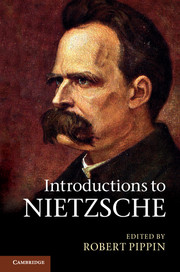Book contents
- Frontmatter
- Contents
- Note to the reader
- Chronology of Nietzsche's life and works
- Introduction
- Chapter 1 Nietzsche: Writings from the early notebooks
- Chapter 2 Nietzsche: The Birth of Tragedy
- Chapter 3 Nietzsche: Untimely Meditations
- Chapter 4 Nietzsche: Human, All Too Human
- Chapter 5 Nietzsche: Daybreak
- Chapter 6 Nietzsche: The Gay Science
- Chapter 7 Nietzsche: Thus Spoke Zarathustra
- Chapter 8 Nietzsche: Beyond Good and Evil
- Chapter 9 Nietzsche: On the Genealogy of Morality
- Chapter 10 Nietzsche: The Anti-Christ, Ecce Homo, Twilight of the Idols
- Chapter 11 Nietzsche: Writings from the late notebooks
- Select bibliography
- Index
- References
Chapter 10 - Nietzsche: The Anti-Christ, Ecce Homo, Twilight of the Idols
Published online by Cambridge University Press: 05 June 2012
- Frontmatter
- Contents
- Note to the reader
- Chronology of Nietzsche's life and works
- Introduction
- Chapter 1 Nietzsche: Writings from the early notebooks
- Chapter 2 Nietzsche: The Birth of Tragedy
- Chapter 3 Nietzsche: Untimely Meditations
- Chapter 4 Nietzsche: Human, All Too Human
- Chapter 5 Nietzsche: Daybreak
- Chapter 6 Nietzsche: The Gay Science
- Chapter 7 Nietzsche: Thus Spoke Zarathustra
- Chapter 8 Nietzsche: Beyond Good and Evil
- Chapter 9 Nietzsche: On the Genealogy of Morality
- Chapter 10 Nietzsche: The Anti-Christ, Ecce Homo, Twilight of the Idols
- Chapter 11 Nietzsche: Writings from the late notebooks
- Select bibliography
- Index
- References
Summary
In Turin, on 3 January 1889, Nietzsche suffered an irrevocable mental collapse. By the time of his death, in 1900, he had become wholly physically incapacitated as well. It seems probable that the cause was syphilis. It is apparently common for syphilitics to experience a period of uplift, a remarkable sense of well-being, in the months preceding the final collapse. Certainly this was so in Nietzsche's case. In the year before his breakdown his letters are increasingly touched with euphoria. His health, extremely poor for well over a decade, seems to him to be on the mend: ‘I have just looked at myself in a mirror – I have never before appeared as I do now: in exemplary good spirits, well-nourished, and looking ten years younger than I ought to’; ‘my health, like the weather, appears every day with irrepressible brightness and gaiety’. He feels more equal than he has ever felt to the most demanding of intellectual tasks: ‘it is my great harvest-time. Everything comes easily to me, everything I try succeeds, notwithstanding that no one has yet had such great matters in hand as I have’; ‘the heaviest tasks, for which no man has yet been sufficiently strong, come easily’. His estimate of himself and of his abilities acquires a megalomanic tinge: ‘in two months I shall be the first name on earth’; ‘What is remarkable here in Turin is the fascination I exercise on people…every face changes; women gaze after me in the street’; ‘there are no longer any accidents in my life’. And these remarks – and there are many like them – inevitably raise a preliminary question. Are the philosophical works that Nietzsche produced in this final year, the works collected here in this volume, the products of an already-deranged mind?
NIETZSCHE'S SANITY
The 1888 texts are certainly very diverse. One – Twilight of the Idols – proceeds in a distilled version of Nietzsche's established aphoristic manner. Two – The Anti-Christ and The Case of Wagner – are sustained polemics, directed, respectively, against institutionalized Christianity and Richard Wagner's music dramas. One – Ecce Homo – is a strange sort of autobio-graphy. And the remaining work – Nietzsche Contra Wagner – is an anthology of aphorisms culled, sometimes with minor alterations, from Nietzsche's other books. But variety is hardly a sign of madness.
- Type
- Chapter
- Information
- Introductions to Nietzsche , pp. 215 - 239Publisher: Cambridge University PressPrint publication year: 2012
References
- 2
- Cited by

